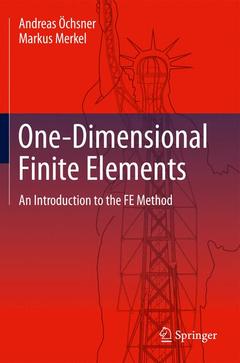One-Dimensional Finite Elements, 2012 An Introduction to the FE Method
Auteurs : Öchsner Andreas, Merkel Markus

This textbook presents finite element methods using exclusively one-dimensional elements. The aim is to present the complex methodology in an easily understandable but mathematically correct fashion. The approach of one-dimensional elements enables the reader to focus on the understanding of the principles of basic and advanced mechanical problems. The reader easily understands the assumptions and limitations of mechanical modeling as well as the underlying physics without struggling with complex mathematics. But although the description is easy it remains scientifically correct.
The approach using only one-dimensional elements covers not only standard problems but allows also for advanced topics like plasticity or the mechanics of composite materials. Many examples illustrate the concepts and problems at the end of every chapter help to familiarize with the topics.
Andreas Öchsner, born 1970,is Full Professor in the Department Solid Mechanics and Design at the University of Technology Malaysia (UTM), Malaysia and Head of the Advanced Materials and Structure Lab. Having obtained a Diploma Degree (Dipl.-Ing.) in Aeronautical Engineering at the University of Stuttgart (1997), Germany, he spent the time from 1997-2003 at the University of Erlangen-Nuremberg as a research and teaching assistant to obtain his Doctor of Engineering Sciences (Dr.-Ing.). From 2003-2006, he worked as Assistant Professor in the Department of Mechanical Engineering and Head of the Cellular Metals Group affiliated with the University of Aveiro, Portugal. His research interests are related to experimental and computational mechanics, cellular metals and thin structures and interphases. He has published over 290 scientific publications, comprising 11 research monographs, 13 book chapters and one teaching book on finite element methods. He is the general chairman of six international conferences on computational and experimental engineering (ACE-X series) and eight international conferences in the area of heat and mass transfer (DSL series). His editorial work comprises posts as Editor-in-chief of the international journal Continuum Mechanics and Thermodynamics (Springer), Editor-in-chief of the Springer book series on Advanced Structured Materials and Editor of SpringerBriefs in Applied Sciences and Technology: Computational Mechanics. His research activities were recognised in 2010 by the award of a higher doctorate degree (D.Sc.) by the University of Newcastle, Australia.
MARKUS MERKEL, born 1967, is Full Professor at Aalen University of Applied Sciences. He graduated 1993 at the University of Erlangen-Nuremberg (Germany) in Mechanical Engineering and finished his PhD-studies in 1998. Between 1999 and 2004, Markus Merkel worked at the International Technical Development Centre of Adam Opel AG. He became Professer in2004 for E
Date de parution : 11-2014
Ouvrage de 400 p.
15.5x23.5 cm
Ancienne édition
Accéder à la nouvelle édition.
Date de parution : 10-2012
Ouvrage de 400 p.
15.5x23.5 cm
Ancienne édition
Accéder à la nouvelle édition.



